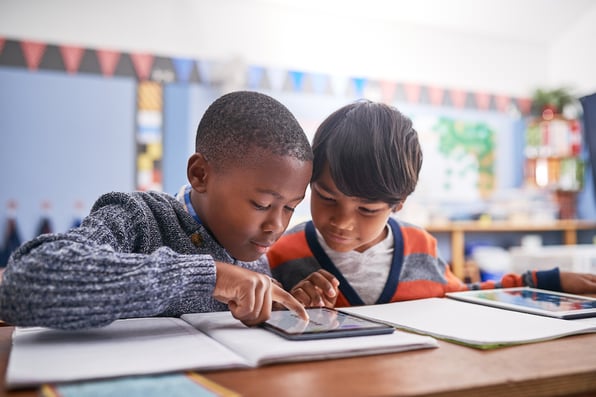COVID-19 has changed how children are being educated in the United States in many ways—with technology and remote learning at the center. According to the National Center for Education Statistics (NCES), the pandemic truly highlighted the need for equal access to technology for student success. Besides the idea of access, students who felt comfortable with computer use had one less barrier to overcome to continue to learn and complete their assignments away from school.
Fortunately, by the time children reach school age, it’s likely that they’ve had some exposure to a desktop, laptop, gaming unit, tablet, or smartphone—and probably more than one of them. As a parent, you can help your elementary school-aged children succeed by making sure they can safely and effectively use computers when they must absorb and understand lessons based on a screen. Here are tips.
Internet Safety
There are, unfortunately, people who will try to take advantage of children who are online. To protect your kids, KidsHealth.org suggests exploring and appropriately using parental control options and/or software to block access to sites you don’t want them to visit. Depending upon your level of concern, also consider software that tracks online activity. No matter which route you choose, have a conversation with your children, letting them know that you’re using this technology to help keep them safe.
Establish family rules related to privacy, which would include not posting or otherwise sharing personal pictures or information outside of what the school requires. Tell them not to share passwords with anyone other than you and, if they get a threatening message—or even one that makes them feel uncomfortable—they should tell the teacher and you.
Keep computers in shared family spaces at home while making sure that your children can have the quiet conditions they need for remote learning or, if physically going to school, during homework time. What’s most important: keeping an open line of communication with your children so that they feel comfortable talking to you if problems occur.
Protecting the Computers
This aspect of computer education can get overlooked. Fortunately, rules can be pretty simple, such as washing and drying hands before using a computer; being gentle with keyboards and other components, and keeping food and drink away so that crumbs don’t get in where they shouldn’t, and liquid doesn’t spill onto the keyboard or computer.
Computer Proficiency
Tekkieuni.com describes skills that kids will need to effectively use computers for learning. For example, there’s typing—also called keyboarding. The more accurately your child can type—and the speed at which it’s done—can be a difference-maker with schoolwork. Some children more naturally pick up this skill; practicing with software programs like Typing Club can help.
Children will need to know how to communicate with their school, perhaps through email or the school’s online platform. Plus, each year, they’ll be expected to know more about researching online to gather information for book reports and other projects. Even if your child knows how to use a search engine like Google, that doesn’t mean they know how to leverage them to effectively search for information—or know which sites provide reliable info.
Horizon Education Centers
Horizon is proud to be a 21st Century Community Learning Center. There we combine the best of technological learning with personal instruction for maximum success in today’s world. Nearly half of the students who attend this type of community learning center improve their math and language arts grades with nearly two-thirds of them improving in homework completion and class participation.









